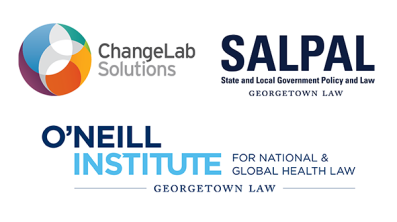Preemption & Policymaking in Public Health Law: From Local to Global
A comprehensive webinar offering diverse perspectives on preemption
This 90-minute webinar — presented by the Georgetown Project on State and Local Government Policy and Law, the O’Neill Institute for National and Global Health Law, and ChangeLab Solutions — introduces viewers to the roles of various levels of government in public health policymaking and the ways that preemption is interfering with local democratic processes.
The doctrine of preemption means that a higher level of government (e.g., federal or state government) may limit or eliminate the power of a lower level of government (e.g., state or local government) to regulate a specific issue. On its face, preemption is a neutral legal concept, but in the past decade, preemptive laws have been used with increasing regularity to thwart local policymaking that promotes health and advances equity.
Introduction: Professor Meryl Chertoff
Keynote: Preemption: What a Technical Term Means for Innovation in Health in American Neighborhoods, Urban and Rural
- Keynote Speaker: Jewel Mullen, MD, MPH
Panel 1: Why Are States Preempting Local Public Health Innovation?
- Moderator: Meryl Chertoff
- Panelists: Sabrina Adler, Kim Haddow, and Rick Su
Panel 2: Global Perspectives on Subnational Government and Central Government Relations on Public Health
- Moderator: Renu Singh
- Panelists: Marie-Louise Aren and Felix Knüpling
Panel 3: Harm Reduction: A U.S. Case Study
- Moderator: Sonia Canzater
- Panelists: Jennifer Oliva and Zachary Talbott
Explore our resources on preemption.
Webinar
Note: The webinar recording covers a much broader set of topics than the slides. Download the slides for resources and subject-specific information.
Presenters
Sabrina Adler is vice president of law at ChangeLab Solutions. She works primarily on legal and policy issues related to preemption and good governance, the commercial determinants of health, and healthy children and families. She has coauthored publications and presented on many issues at the intersection of law and public health, including sugary drink policies, food policy, preemption, and health equity. Before joining ChangeLab Solutions, Adler assisted legal aid attorneys with child care cases and did policy work on obesity prevention and health as a staff attorney at the Child Care Law Center. In addition, she received a Skadden Foundation Fellowship to found the San Francisco Medical-Legal Partnership, in which she provided direct legal services to low-income pediatric patients and their families. Her practice included advocacy in the areas of housing, health, public benefits, disability, education, and family law. Adler graduated from Brown University and Stanford Law School.
Marie-Louise Aren is currently a doctoral candidate in international tax law at the University of Pretoria. Aren adopts a transdisciplinary approach to knowledge and problem solving, leading her to serve on various research and drafting teams such as the Nigerian Petroleum Industry Governance Laws Draft Team; Advocacy Committee for the Eradication of Female Genital Mutilation in Nigeria; the development team for the Nigerian Justice Policy; and the National Law Review Team responsible for reviewing the Laws of the Federation of Nigeria 2018.
Sonia Canzater is adjunct professor of law at the Georgetown University Law Center and associate director of the Infectious Diseases Initiative at the O’Neill Institute for National and Global Health Law, overseeing the Hepatitis Policy Project. She is also a part of the O’Neill Institute’s Addiction and Public Policy Initiative, where she works on projects that address issues at the intersection of incidence and prevalence of infectious diseases such as HCV and HIV and the nation’s injection drug use epidemic. Prior to joining the O’Neill Institute, Canzater worked as an adjunct public health instructor at Benedict College and worked for the South Carolina Department of Health and Environmental Control’s Bureau of Maternal and Child Health. Additionally, she worked as a youth drug abuse prevention program coordinator for the Lexington/Richland Alcohol and Drug Abuse Council in Columbia, South Carolina. Canzater is a practicing attorney in the state of Maryland and holds a JD and an MPH from the University of South Carolina and a BA in anthropology from Temple University.
Meryl Chertoff is executive director of the Georgetown Project on State and Local Government Policy and Law and adjunct professor of law at Georgetown Law. She is managing editor of SLoGLaw, the State and Local Government Law Blog. She is a graduate of Harvard College and Law School and served as a law clerk to Federal District Judge Myron H. Thompson (M.D. Ala). Chertoff contributes opinion writing to The Hill, Bloomberg Law, and other publications; has provided expert testimony before state legislatures on various bills; and provides briefings on American federalism to international visitors through programs sponsored by the US State Department. She is admitted to the bar in New York and New Jersey, is a fellow of the American Bar Foundation, and served as an ABA advisor to the Uniform Law Commission’s Study Committee on State Governance During Public Health Emergencies in 2020. She is a member of the board of directors of ChangeLab Solutions.
Kim Haddow is the founder of the Local Solutions Support Center, an organization formed to connect, coordinate, and create opportunities to counter the misuse of preemption; document its consequences for BIPOC, women, and workers in low-wage jobs; and affirm and strengthen local authority and independence. For the past 25 years as president of Haddow Communications, Inc., Haddow has worked with a broad range of nonprofit organizations on messaging and branding, strategic campaign planning, and opposition management. Haddow has also worked as national communications director for the Sierra Club and at Greer, Margolis, Mitchell, Burns, advising political, initiative, and cause-related marketing campaigns. Haddow began her career at WWL-AM in New Orleans, where she worked as a reporter and assignment editor and managed the news department.
Felix Knüpling joined the Forum of Federations in 2007 and worked at its headquarters in Ottawa until 2013. He is currently based in Berlin, where he manages the Forum's projects. Knüpling has provided expert advice on federal reform in emerging federations such as Myanmar, Nepal, the Philippines, and Sri Lanka. Prior to joining the Forum of Federations, he worked for the German parliament – the Bundestag – and at the Parliamentary Assembly of NATO in Brussels. Knüpling holds an MS in political science from Freie Universität Berlin and a BA in international relations from the University of Kent. He has co-edited several books on federalism.
Jewel Mullen is associate dean for health equity at Dell Medical School at the University of Texas and associate professor in the school’s population health and internal medicine departments. She serves as director of health equity for Ascension Seton to help meet health equity goals across its system. Mullen is also a member of the medical executive board at Central Health, where she is director of health equity and quality. She is an internist, epidemiologist, public health physician leader, and former principal deputy assistant secretary for health in the US Department of Health and Human Services (HHS). While at HHS, she also served as acting assistant secretary for health and acting director of the National Vaccine Program Office. Her extensive career also includes the roles of commissioner at the Connecticut Department of Public Health, member of the Advisory Committee to the CDC Director and its subcommittee on health disparities, and president of the Association of State and Territorial Health Officials. She serves on multiple editorial boards and is a member of the Committee on a National Strategy for Cancer Control in the United States at the National Academies of Sciences, Engineering and Medicine. Board-certified in internal medicine, Mullen received her bachelor’s degree and MPH from Yale University, where she also completed a post-doctoral fellowship in psychosocial epidemiology. She graduated from the Mount Sinai School of Medicine and holds an MPA from Harvard University’s John F. Kennedy School of Government.
Jennifer D. Oliva is associate dean for faculty research & development as well as director of the Center for Health & Pharmaceutical Law at Seton Hall Law, where she specializes in health law and policy, FDA law, drug policy, privacy law, evidence, and complex litigation. She also is a senior scholar at the O’Neill Institute for National and Global Health Law at Georgetown Law and serves on the National Pain Advocacy Center’s Science & Policy Advisory Council. She is a graduate of Georgetown University Law Center and earned an MBA from the University of Oxford. Oliva served as a law clerk to the Honorable Stephanie K. Seymour on the US Court of Appeals for the Tenth Circuit and the Honorable Thomas L. Ambro on the US Court of Appeals for the Third Circuit. She was subsequently appointed deputy state solicitor of the State of Delaware by then–Attorney General Beau Biden. She is a US Army veteran and admitted to the bar in Delaware, California, and the District of Columbia. Her scholarship has been published by or is forthcoming in the California Law Review, Duke Law Journal, Northwestern University Law Review, Ohio State Law Journal, North Carolina Law Review, Washington Law Review, and an online companion to the University of Chicago Law Review.
Renu Singh is an incoming faculty member and research fellow at Bocconi University. She is also a scholar at the O’Neill Institute for National and Global Health Law at Georgetown Law and an executive board member for the International Studies Association's Global Health Studies Section. Previously, Singh was a research assistant professor at the Hong Kong University of Science and Technology, a Fulbright fellow at the Hertie School in Berlin, and a DAAD scholar at the Helmholtz Zentrum München and the Max Planck Institute for Social Law and Social Policy in Munich. Singh’s work has been published or is forthcoming in BMJ Global Health; International Studies Quarterly; the Journal of Health Politics, Policy and Law; Cleaner and Responsible Consumption; The Washington Post; Foreign Policy Magazine; and The Conversation; and from the Carnegie Endowment — among others. Singh holds a BA in political science and a BS in microbiology from the University of Massachusetts Amherst, an MS in public policy and administration from the London School of Economics and Political Science, and an MA and PhD in government from Georgetown University.
Rick Su is professor of law at the University of North Carolina School of Law, where he teaches and writes in the areas of local government law, immigration, and federalism. His research focuses on the intersection between cities and immigration. His work has appeared in the Columbia Law Review, the William & Mary Law Review, the Emory Law Journal, and the North Carolina Law Review. Su received his BA from Dartmouth College and his JD from Harvard Law School. After graduating from law school, he clerked for the Honorable Stephen Reinhardt on the US Court of Appeals for the Ninth Circuit and worked in the US Department of Housing and Urban Development. Prior to joining the Carolina Law faculty in 2019, Su taught at the University at Buffalo School of Law, where he won the faculty teaching award in 2009 and 2015.
Zachary Talbott is a native of Eastern Tennessee and holds a BA in political science and an MSW in advanced clinical practice. Talbott co-founded Counseling Solutions Treatment Centers, which operated opiate treatment programs (OTPs) in Georgia and North Carolina; he also served as program sponsor and operations director of the OTPs. He worked as chief clinical officer of ReVIDA Recovery Centers while establishing Talbott Legacy Centers — a Tennessee company that was granted a certificate of need for the establishment of new OTPs in Tennessee — where he currently serves as president and CEO. Talbott holds graduate-level licensure/certification in Georgia and Tennessee as an addiction counselor and clinical supervisor; internationally reciprocal credentials through IC&RC; a Master Addiction Counselor through the National Certification Commission for Addiction Professionals; and a Certified Medication-Assisted Treatment Advocate through National Alliance for Medication Assisted Recovery. Talbott currently serves as president and board chair of the Alcohol & Drug Abuse Certification Board of Georgia and serves on the executive committee of the board of directors of the Opioid Treatment Providers of Georgia – the Georgia state chapter of American Association for the Treatment of Opiate Dependence.












